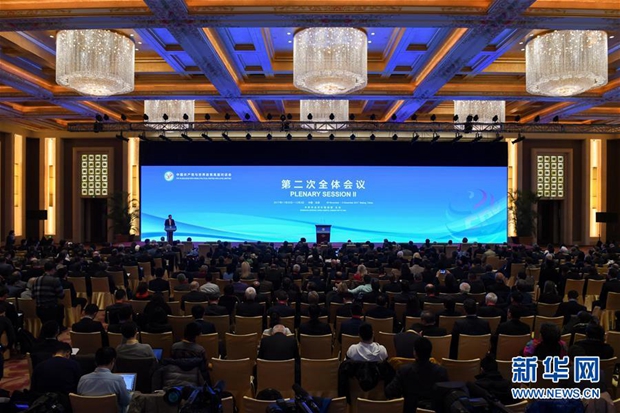Broader vision guides CPC to establish ties with world's political parties
- By Ritu Raj Subedi
 0 Comment(s)
0 Comment(s) Print
Print E-mail China.org.cn, December 13, 2017
E-mail China.org.cn, December 13, 2017

Communist Party of China (CPC) in Dialogue with World Political Parties High-level Meeting [Photo/Xinhua]
The Communist Party of China (CPC) is now pursuing a broader vision for maintaining sound relations with political parties all across the world. Its practical and flexible approach was well reflected in its desire for a meaningful dialogue with parties of divergent ideologies at a recent Beijing forum entitled "CPC in Dialogue with World Political Parties High-Level Meeting.”
As Party General Secretary Xi Jinping clearly stated:"The CPC is willing to work with other political parties around the world to promote the building of a community with a shared future for humanity and create a better world.” These words were addressed to 600 representatives of nearly 300 political parties and organizations from more than 120 countries.
The CPC is the world's largest party and is leading the world's second largest economy. Unlike other communist parties, the CPC's success story is amazing and almost mesmerizing. It successfully engineered the New Democracy revolution and flushed out the foreign aggressors threatening the homeland.
With the rise of paramount leader Deng, the CPC's orientation became more pragmatic and dynamic. It shook off rigidity and developed socialism with Chinese characteristics. While allowing the market forces to grow and flourish, the CPC never wavered from the core value of communism and its mission of building a prosperous and modern socialist state.
Today China is a global power with overwhelming political and economic clout; however, it has refused to copy the style of the old Soviet Union to lead the communist parties from all over the world under the banner of the Comintern (The Communist International) and Cominform (Communist Information Bureau).
Xi, who is also China's president, proposed developing a new model of party-to-party relations to seek common ground, and to respect and learn from one another. He is for building an international network of political parties for mutual cooperation and exchanges of ideas at multiple levels.
In the next five years, the CPC is expected to invite 15,000 members of foreign political parties to China for exchanges. It is strongly seeking to interact and work with non-communist parties everywhere for the common cause of humanity.
In the past, there was tendency of exporting "revolution" to other countries, which alienated communist nations from non-communist ones. In order to promote confidence in the latter, Xi said the CPC would neither import foreign models of development nor export the Chinese model.
In 2013, Xi unveiled the concept of the Belt and Road Initiative (BRI) as an instrument of building a shared future for humanity. It has now become "a huge cooperation platform for countries concerned to realize their common development."
The BRI has become one of the biggest global development projects involving over 60 countries across the globe. Endorsed by the United Nations, the BRI has been incorporated in the constitution of CPC as it seeks to boost connectivity, mutual cooperation, investment and people-to-people relations.
The ultimate goal of Marxism and Leninism is to create an egalitarian classless society that is free of all forms of exploitations and oppressions. President Xi has embraced this vision when he underlined that all countries should create fair, just and shared security to eliminate the root causes of war and rescue people from the pains brought about by war.
The major wars in the past took place owing to imperialist ambition and capitalist greed to expand markets and capture territories for their resources. Xi noted that efforts now needed to be made to build a safe world free of fear in which no country could gain its security at the cost of others.
He called for adopting a new concept of common, comprehensive, cooperative and sustainable security for lasting peace and prosperity. Only collective efforts would enable nations to end poverty; however, Xi warned that the old-school winner-takes-all mentality and beggar-thy-neighbor approach by any country would not only block the door for others, but also barricade their own path.
At a time when the U.S. is retreating into a cocoon of a protectionist and isolationist policy, Xi has stressed economic globalization that is "more open and inclusive, more balanced, more equitable and beneficial to all, to bring prosperity to all countries." This approach is essential for making globalization fair and international order more democratic.
Ritu Raj Subedi is an associate editor of The Rising Nepal.
Opinion articles reflect the views of their authors, not necessarily those of China.org.cn.






Go to Forum >>0 Comment(s)